Challenges and Strategies: A Case Study of London's Visitor Economy
VerifiedAdded on 2023/06/17
|10
|3647
|253
Case Study
AI Summary
This case study delves into the visitor economy of London, examining its development and the challenges it faces, including deprivation, Brexit, tourist influx, COVID-19, and transportation issues. The analysis covers London's attractiveness to different visitor segments (enthusiasts, explorers, and house guests) and the impact of historical attractions, bus tours, and sporting events on the economy. It highlights the decline in revenue despite increased tourist numbers, attributing this to shorter stays and reduced spending power. Furthermore, the study explores the effects of the COVID-19 pandemic and transportation problems on London's tourism sector. The report concludes with several recommendations aimed at overcoming these challenges and fostering sustainable growth in London's visitor economy. This document is available on Desklib, a platform offering a variety of study tools and resources for students.

CASE
STUDY
STUDY
Paraphrase This Document
Need a fresh take? Get an instant paraphrase of this document with our AI Paraphraser
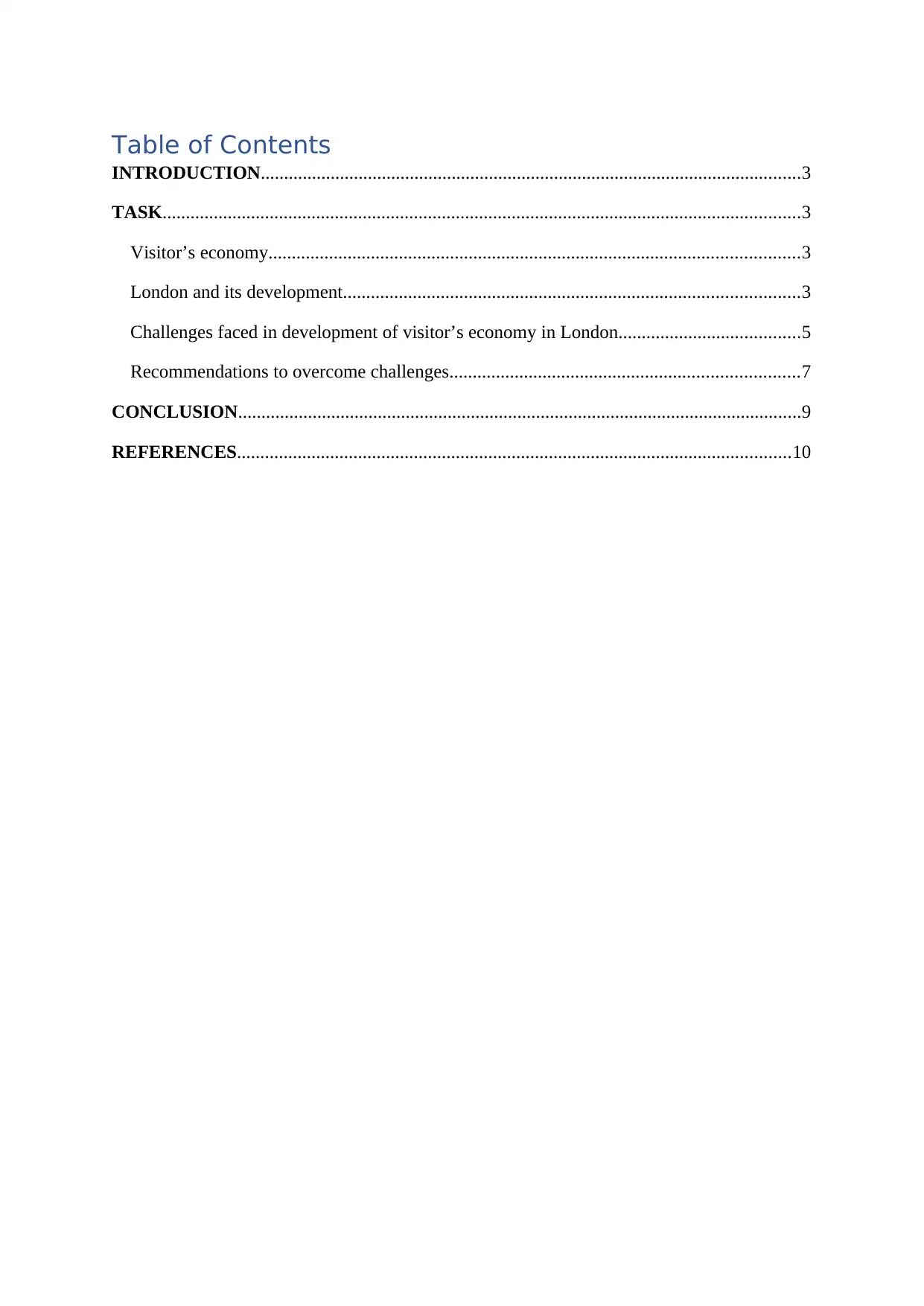
Table of Contents
INTRODUCTION....................................................................................................................3
TASK.........................................................................................................................................3
Visitor’s economy..................................................................................................................3
London and its development..................................................................................................3
Challenges faced in development of visitor’s economy in London.......................................5
Recommendations to overcome challenges...........................................................................7
CONCLUSION.........................................................................................................................9
REFERENCES.......................................................................................................................10
INTRODUCTION....................................................................................................................3
TASK.........................................................................................................................................3
Visitor’s economy..................................................................................................................3
London and its development..................................................................................................3
Challenges faced in development of visitor’s economy in London.......................................5
Recommendations to overcome challenges...........................................................................7
CONCLUSION.........................................................................................................................9
REFERENCES.......................................................................................................................10
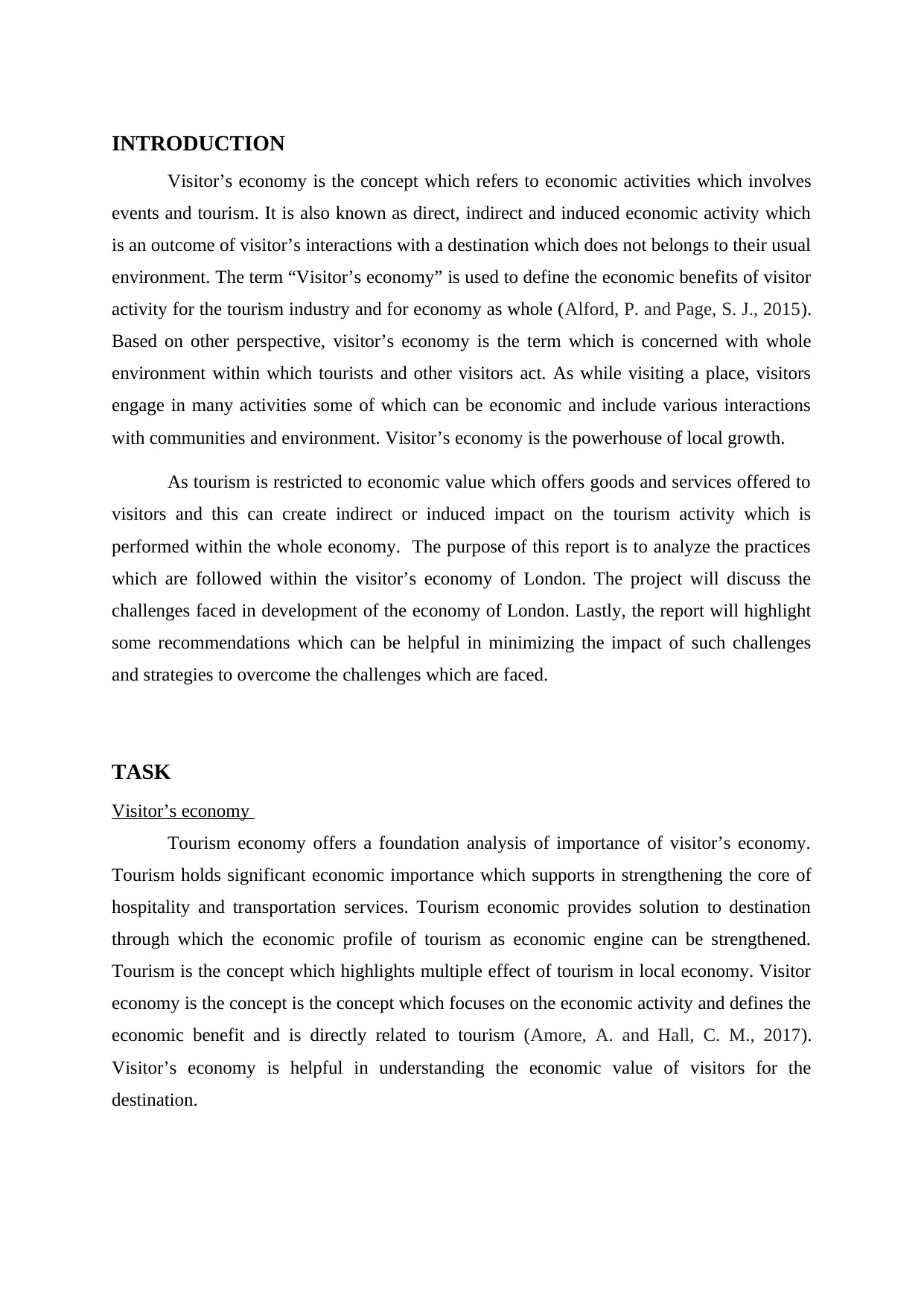
INTRODUCTION
Visitor’s economy is the concept which refers to economic activities which involves
events and tourism. It is also known as direct, indirect and induced economic activity which
is an outcome of visitor’s interactions with a destination which does not belongs to their usual
environment. The term “Visitor’s economy” is used to define the economic benefits of visitor
activity for the tourism industry and for economy as whole (Alford, P. and Page, S. J., 2015).
Based on other perspective, visitor’s economy is the term which is concerned with whole
environment within which tourists and other visitors act. As while visiting a place, visitors
engage in many activities some of which can be economic and include various interactions
with communities and environment. Visitor’s economy is the powerhouse of local growth.
As tourism is restricted to economic value which offers goods and services offered to
visitors and this can create indirect or induced impact on the tourism activity which is
performed within the whole economy. The purpose of this report is to analyze the practices
which are followed within the visitor’s economy of London. The project will discuss the
challenges faced in development of the economy of London. Lastly, the report will highlight
some recommendations which can be helpful in minimizing the impact of such challenges
and strategies to overcome the challenges which are faced.
TASK
Visitor’s economy
Tourism economy offers a foundation analysis of importance of visitor’s economy.
Tourism holds significant economic importance which supports in strengthening the core of
hospitality and transportation services. Tourism economic provides solution to destination
through which the economic profile of tourism as economic engine can be strengthened.
Tourism is the concept which highlights multiple effect of tourism in local economy. Visitor
economy is the concept is the concept which focuses on the economic activity and defines the
economic benefit and is directly related to tourism (Amore, A. and Hall, C. M., 2017).
Visitor’s economy is helpful in understanding the economic value of visitors for the
destination.
Visitor’s economy is the concept which refers to economic activities which involves
events and tourism. It is also known as direct, indirect and induced economic activity which
is an outcome of visitor’s interactions with a destination which does not belongs to their usual
environment. The term “Visitor’s economy” is used to define the economic benefits of visitor
activity for the tourism industry and for economy as whole (Alford, P. and Page, S. J., 2015).
Based on other perspective, visitor’s economy is the term which is concerned with whole
environment within which tourists and other visitors act. As while visiting a place, visitors
engage in many activities some of which can be economic and include various interactions
with communities and environment. Visitor’s economy is the powerhouse of local growth.
As tourism is restricted to economic value which offers goods and services offered to
visitors and this can create indirect or induced impact on the tourism activity which is
performed within the whole economy. The purpose of this report is to analyze the practices
which are followed within the visitor’s economy of London. The project will discuss the
challenges faced in development of the economy of London. Lastly, the report will highlight
some recommendations which can be helpful in minimizing the impact of such challenges
and strategies to overcome the challenges which are faced.
TASK
Visitor’s economy
Tourism economy offers a foundation analysis of importance of visitor’s economy.
Tourism holds significant economic importance which supports in strengthening the core of
hospitality and transportation services. Tourism economic provides solution to destination
through which the economic profile of tourism as economic engine can be strengthened.
Tourism is the concept which highlights multiple effect of tourism in local economy. Visitor
economy is the concept is the concept which focuses on the economic activity and defines the
economic benefit and is directly related to tourism (Amore, A. and Hall, C. M., 2017).
Visitor’s economy is helpful in understanding the economic value of visitors for the
destination.
⊘ This is a preview!⊘
Do you want full access?
Subscribe today to unlock all pages.

Trusted by 1+ million students worldwide
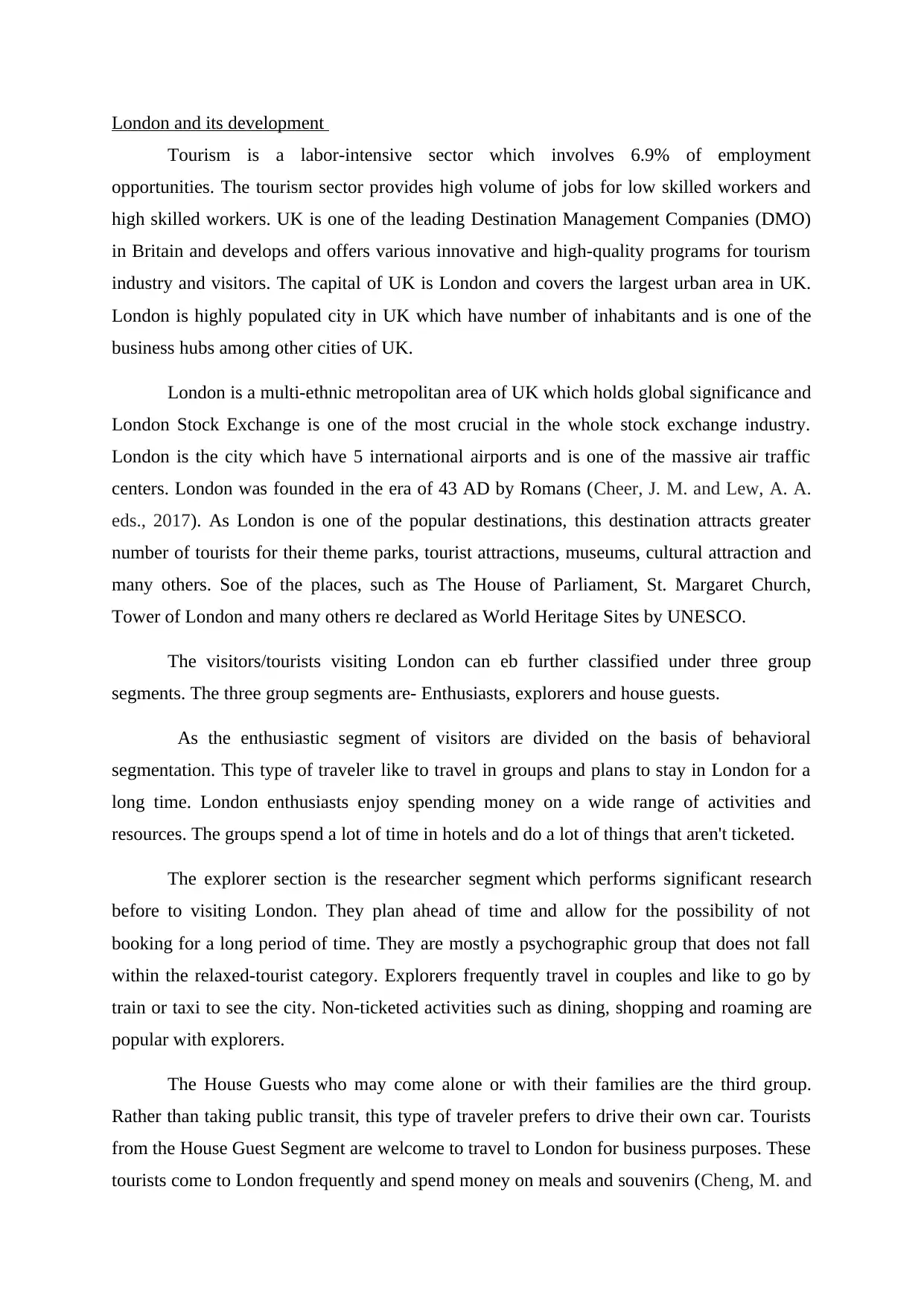
London and its development
Tourism is a labor-intensive sector which involves 6.9% of employment
opportunities. The tourism sector provides high volume of jobs for low skilled workers and
high skilled workers. UK is one of the leading Destination Management Companies (DMO)
in Britain and develops and offers various innovative and high-quality programs for tourism
industry and visitors. The capital of UK is London and covers the largest urban area in UK.
London is highly populated city in UK which have number of inhabitants and is one of the
business hubs among other cities of UK.
London is a multi-ethnic metropolitan area of UK which holds global significance and
London Stock Exchange is one of the most crucial in the whole stock exchange industry.
London is the city which have 5 international airports and is one of the massive air traffic
centers. London was founded in the era of 43 AD by Romans (Cheer, J. M. and Lew, A. A.
eds., 2017). As London is one of the popular destinations, this destination attracts greater
number of tourists for their theme parks, tourist attractions, museums, cultural attraction and
many others. Soe of the places, such as The House of Parliament, St. Margaret Church,
Tower of London and many others re declared as World Heritage Sites by UNESCO.
The visitors/tourists visiting London can eb further classified under three group
segments. The three group segments are- Enthusiasts, explorers and house guests.
As the enthusiastic segment of visitors are divided on the basis of behavioral
segmentation. This type of traveler like to travel in groups and plans to stay in London for a
long time. London enthusiasts enjoy spending money on a wide range of activities and
resources. The groups spend a lot of time in hotels and do a lot of things that aren't ticketed.
The explorer section is the researcher segment which performs significant research
before to visiting London. They plan ahead of time and allow for the possibility of not
booking for a long period of time. They are mostly a psychographic group that does not fall
within the relaxed-tourist category. Explorers frequently travel in couples and like to go by
train or taxi to see the city. Non-ticketed activities such as dining, shopping and roaming are
popular with explorers.
The House Guests who may come alone or with their families are the third group.
Rather than taking public transit, this type of traveler prefers to drive their own car. Tourists
from the House Guest Segment are welcome to travel to London for business purposes. These
tourists come to London frequently and spend money on meals and souvenirs (Cheng, M. and
Tourism is a labor-intensive sector which involves 6.9% of employment
opportunities. The tourism sector provides high volume of jobs for low skilled workers and
high skilled workers. UK is one of the leading Destination Management Companies (DMO)
in Britain and develops and offers various innovative and high-quality programs for tourism
industry and visitors. The capital of UK is London and covers the largest urban area in UK.
London is highly populated city in UK which have number of inhabitants and is one of the
business hubs among other cities of UK.
London is a multi-ethnic metropolitan area of UK which holds global significance and
London Stock Exchange is one of the most crucial in the whole stock exchange industry.
London is the city which have 5 international airports and is one of the massive air traffic
centers. London was founded in the era of 43 AD by Romans (Cheer, J. M. and Lew, A. A.
eds., 2017). As London is one of the popular destinations, this destination attracts greater
number of tourists for their theme parks, tourist attractions, museums, cultural attraction and
many others. Soe of the places, such as The House of Parliament, St. Margaret Church,
Tower of London and many others re declared as World Heritage Sites by UNESCO.
The visitors/tourists visiting London can eb further classified under three group
segments. The three group segments are- Enthusiasts, explorers and house guests.
As the enthusiastic segment of visitors are divided on the basis of behavioral
segmentation. This type of traveler like to travel in groups and plans to stay in London for a
long time. London enthusiasts enjoy spending money on a wide range of activities and
resources. The groups spend a lot of time in hotels and do a lot of things that aren't ticketed.
The explorer section is the researcher segment which performs significant research
before to visiting London. They plan ahead of time and allow for the possibility of not
booking for a long period of time. They are mostly a psychographic group that does not fall
within the relaxed-tourist category. Explorers frequently travel in couples and like to go by
train or taxi to see the city. Non-ticketed activities such as dining, shopping and roaming are
popular with explorers.
The House Guests who may come alone or with their families are the third group.
Rather than taking public transit, this type of traveler prefers to drive their own car. Tourists
from the House Guest Segment are welcome to travel to London for business purposes. These
tourists come to London frequently and spend money on meals and souvenirs (Cheng, M. and
Paraphrase This Document
Need a fresh take? Get an instant paraphrase of this document with our AI Paraphraser
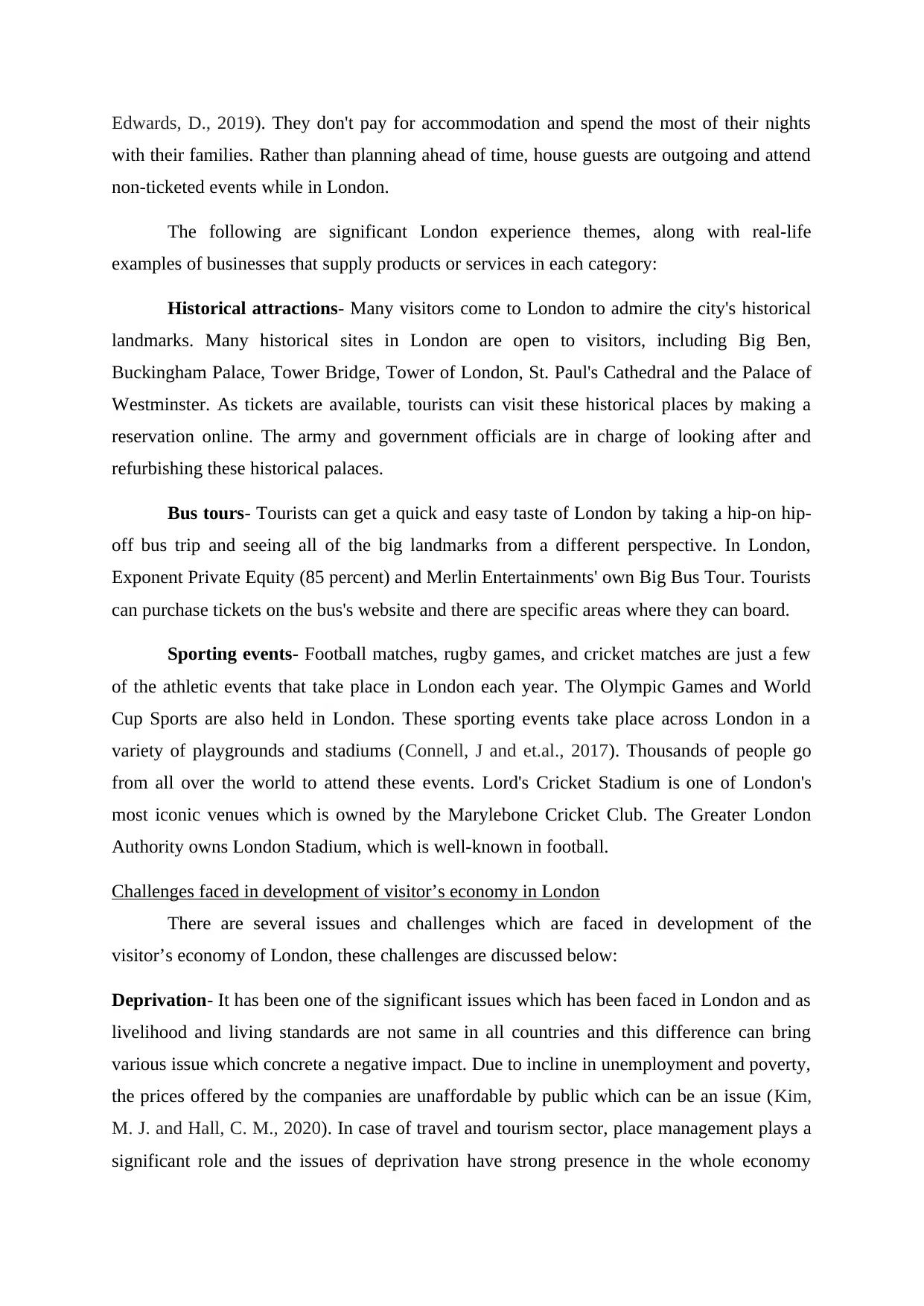
Edwards, D., 2019). They don't pay for accommodation and spend the most of their nights
with their families. Rather than planning ahead of time, house guests are outgoing and attend
non-ticketed events while in London.
The following are significant London experience themes, along with real-life
examples of businesses that supply products or services in each category:
Historical attractions- Many visitors come to London to admire the city's historical
landmarks. Many historical sites in London are open to visitors, including Big Ben,
Buckingham Palace, Tower Bridge, Tower of London, St. Paul's Cathedral and the Palace of
Westminster. As tickets are available, tourists can visit these historical places by making a
reservation online. The army and government officials are in charge of looking after and
refurbishing these historical palaces.
Bus tours- Tourists can get a quick and easy taste of London by taking a hip-on hip-
off bus trip and seeing all of the big landmarks from a different perspective. In London,
Exponent Private Equity (85 percent) and Merlin Entertainments' own Big Bus Tour. Tourists
can purchase tickets on the bus's website and there are specific areas where they can board.
Sporting events- Football matches, rugby games, and cricket matches are just a few
of the athletic events that take place in London each year. The Olympic Games and World
Cup Sports are also held in London. These sporting events take place across London in a
variety of playgrounds and stadiums (Connell, J and et.al., 2017). Thousands of people go
from all over the world to attend these events. Lord's Cricket Stadium is one of London's
most iconic venues which is owned by the Marylebone Cricket Club. The Greater London
Authority owns London Stadium, which is well-known in football.
Challenges faced in development of visitor’s economy in London
There are several issues and challenges which are faced in development of the
visitor’s economy of London, these challenges are discussed below:
Deprivation- It has been one of the significant issues which has been faced in London and as
livelihood and living standards are not same in all countries and this difference can bring
various issue which concrete a negative impact. Due to incline in unemployment and poverty,
the prices offered by the companies are unaffordable by public which can be an issue (Kim,
M. J. and Hall, C. M., 2020). In case of travel and tourism sector, place management plays a
significant role and the issues of deprivation have strong presence in the whole economy
with their families. Rather than planning ahead of time, house guests are outgoing and attend
non-ticketed events while in London.
The following are significant London experience themes, along with real-life
examples of businesses that supply products or services in each category:
Historical attractions- Many visitors come to London to admire the city's historical
landmarks. Many historical sites in London are open to visitors, including Big Ben,
Buckingham Palace, Tower Bridge, Tower of London, St. Paul's Cathedral and the Palace of
Westminster. As tickets are available, tourists can visit these historical places by making a
reservation online. The army and government officials are in charge of looking after and
refurbishing these historical palaces.
Bus tours- Tourists can get a quick and easy taste of London by taking a hip-on hip-
off bus trip and seeing all of the big landmarks from a different perspective. In London,
Exponent Private Equity (85 percent) and Merlin Entertainments' own Big Bus Tour. Tourists
can purchase tickets on the bus's website and there are specific areas where they can board.
Sporting events- Football matches, rugby games, and cricket matches are just a few
of the athletic events that take place in London each year. The Olympic Games and World
Cup Sports are also held in London. These sporting events take place across London in a
variety of playgrounds and stadiums (Connell, J and et.al., 2017). Thousands of people go
from all over the world to attend these events. Lord's Cricket Stadium is one of London's
most iconic venues which is owned by the Marylebone Cricket Club. The Greater London
Authority owns London Stadium, which is well-known in football.
Challenges faced in development of visitor’s economy in London
There are several issues and challenges which are faced in development of the
visitor’s economy of London, these challenges are discussed below:
Deprivation- It has been one of the significant issues which has been faced in London and as
livelihood and living standards are not same in all countries and this difference can bring
various issue which concrete a negative impact. Due to incline in unemployment and poverty,
the prices offered by the companies are unaffordable by public which can be an issue (Kim,
M. J. and Hall, C. M., 2020). In case of travel and tourism sector, place management plays a
significant role and the issues of deprivation have strong presence in the whole economy
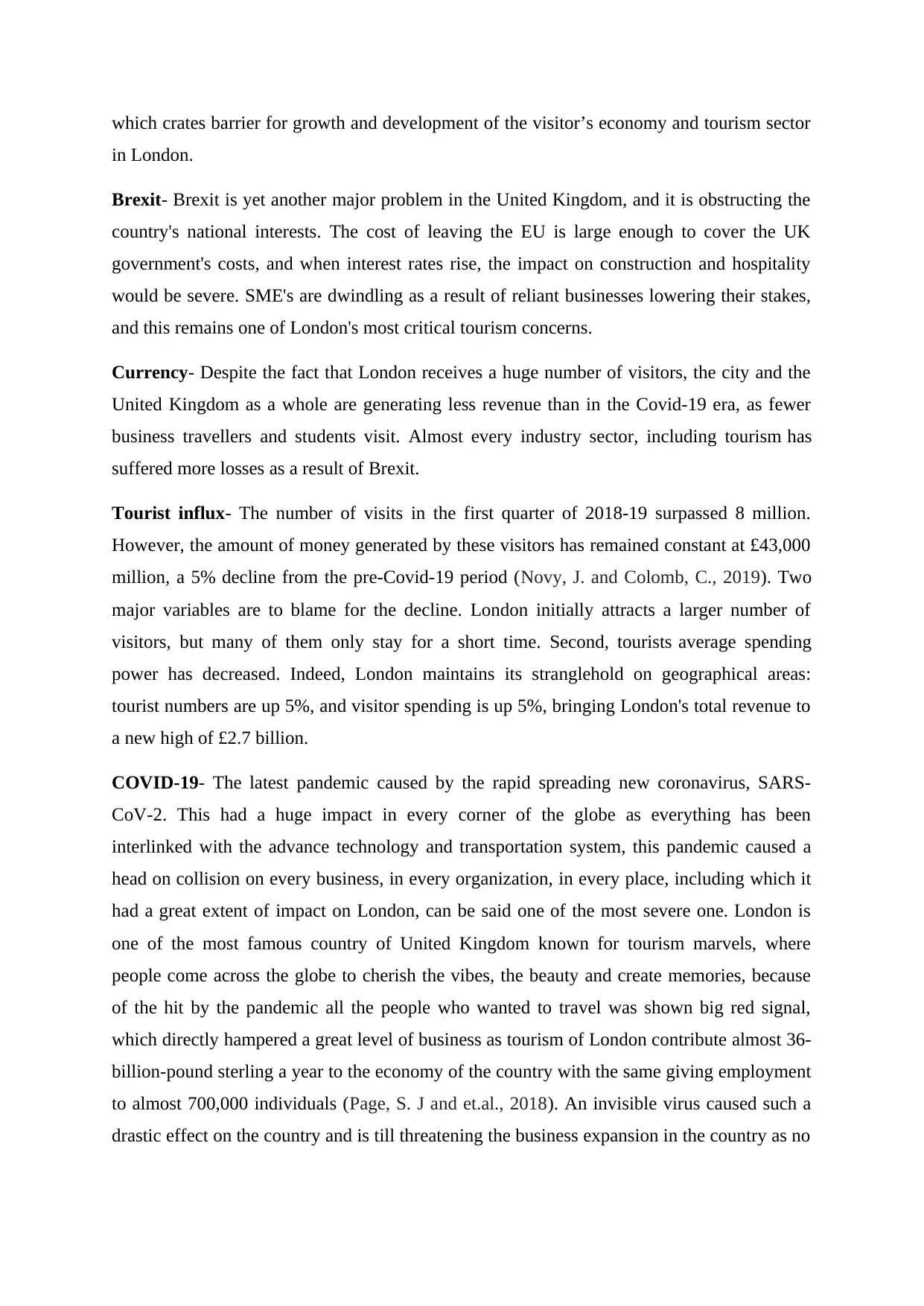
which crates barrier for growth and development of the visitor’s economy and tourism sector
in London.
Brexit- Brexit is yet another major problem in the United Kingdom, and it is obstructing the
country's national interests. The cost of leaving the EU is large enough to cover the UK
government's costs, and when interest rates rise, the impact on construction and hospitality
would be severe. SME's are dwindling as a result of reliant businesses lowering their stakes,
and this remains one of London's most critical tourism concerns.
Currency- Despite the fact that London receives a huge number of visitors, the city and the
United Kingdom as a whole are generating less revenue than in the Covid-19 era, as fewer
business travellers and students visit. Almost every industry sector, including tourism has
suffered more losses as a result of Brexit.
Tourist influx- The number of visits in the first quarter of 2018-19 surpassed 8 million.
However, the amount of money generated by these visitors has remained constant at £43,000
million, a 5% decline from the pre-Covid-19 period (Novy, J. and Colomb, C., 2019). Two
major variables are to blame for the decline. London initially attracts a larger number of
visitors, but many of them only stay for a short time. Second, tourists average spending
power has decreased. Indeed, London maintains its stranglehold on geographical areas:
tourist numbers are up 5%, and visitor spending is up 5%, bringing London's total revenue to
a new high of £2.7 billion.
COVID-19- The latest pandemic caused by the rapid spreading new coronavirus, SARS-
CoV-2. This had a huge impact in every corner of the globe as everything has been
interlinked with the advance technology and transportation system, this pandemic caused a
head on collision on every business, in every organization, in every place, including which it
had a great extent of impact on London, can be said one of the most severe one. London is
one of the most famous country of United Kingdom known for tourism marvels, where
people come across the globe to cherish the vibes, the beauty and create memories, because
of the hit by the pandemic all the people who wanted to travel was shown big red signal,
which directly hampered a great level of business as tourism of London contribute almost 36-
billion-pound sterling a year to the economy of the country with the same giving employment
to almost 700,000 individuals (Page, S. J and et.al., 2018). An invisible virus caused such a
drastic effect on the country and is till threatening the business expansion in the country as no
in London.
Brexit- Brexit is yet another major problem in the United Kingdom, and it is obstructing the
country's national interests. The cost of leaving the EU is large enough to cover the UK
government's costs, and when interest rates rise, the impact on construction and hospitality
would be severe. SME's are dwindling as a result of reliant businesses lowering their stakes,
and this remains one of London's most critical tourism concerns.
Currency- Despite the fact that London receives a huge number of visitors, the city and the
United Kingdom as a whole are generating less revenue than in the Covid-19 era, as fewer
business travellers and students visit. Almost every industry sector, including tourism has
suffered more losses as a result of Brexit.
Tourist influx- The number of visits in the first quarter of 2018-19 surpassed 8 million.
However, the amount of money generated by these visitors has remained constant at £43,000
million, a 5% decline from the pre-Covid-19 period (Novy, J. and Colomb, C., 2019). Two
major variables are to blame for the decline. London initially attracts a larger number of
visitors, but many of them only stay for a short time. Second, tourists average spending
power has decreased. Indeed, London maintains its stranglehold on geographical areas:
tourist numbers are up 5%, and visitor spending is up 5%, bringing London's total revenue to
a new high of £2.7 billion.
COVID-19- The latest pandemic caused by the rapid spreading new coronavirus, SARS-
CoV-2. This had a huge impact in every corner of the globe as everything has been
interlinked with the advance technology and transportation system, this pandemic caused a
head on collision on every business, in every organization, in every place, including which it
had a great extent of impact on London, can be said one of the most severe one. London is
one of the most famous country of United Kingdom known for tourism marvels, where
people come across the globe to cherish the vibes, the beauty and create memories, because
of the hit by the pandemic all the people who wanted to travel was shown big red signal,
which directly hampered a great level of business as tourism of London contribute almost 36-
billion-pound sterling a year to the economy of the country with the same giving employment
to almost 700,000 individuals (Page, S. J and et.al., 2018). An invisible virus caused such a
drastic effect on the country and is till threatening the business expansion in the country as no
⊘ This is a preview!⊘
Do you want full access?
Subscribe today to unlock all pages.

Trusted by 1+ million students worldwide
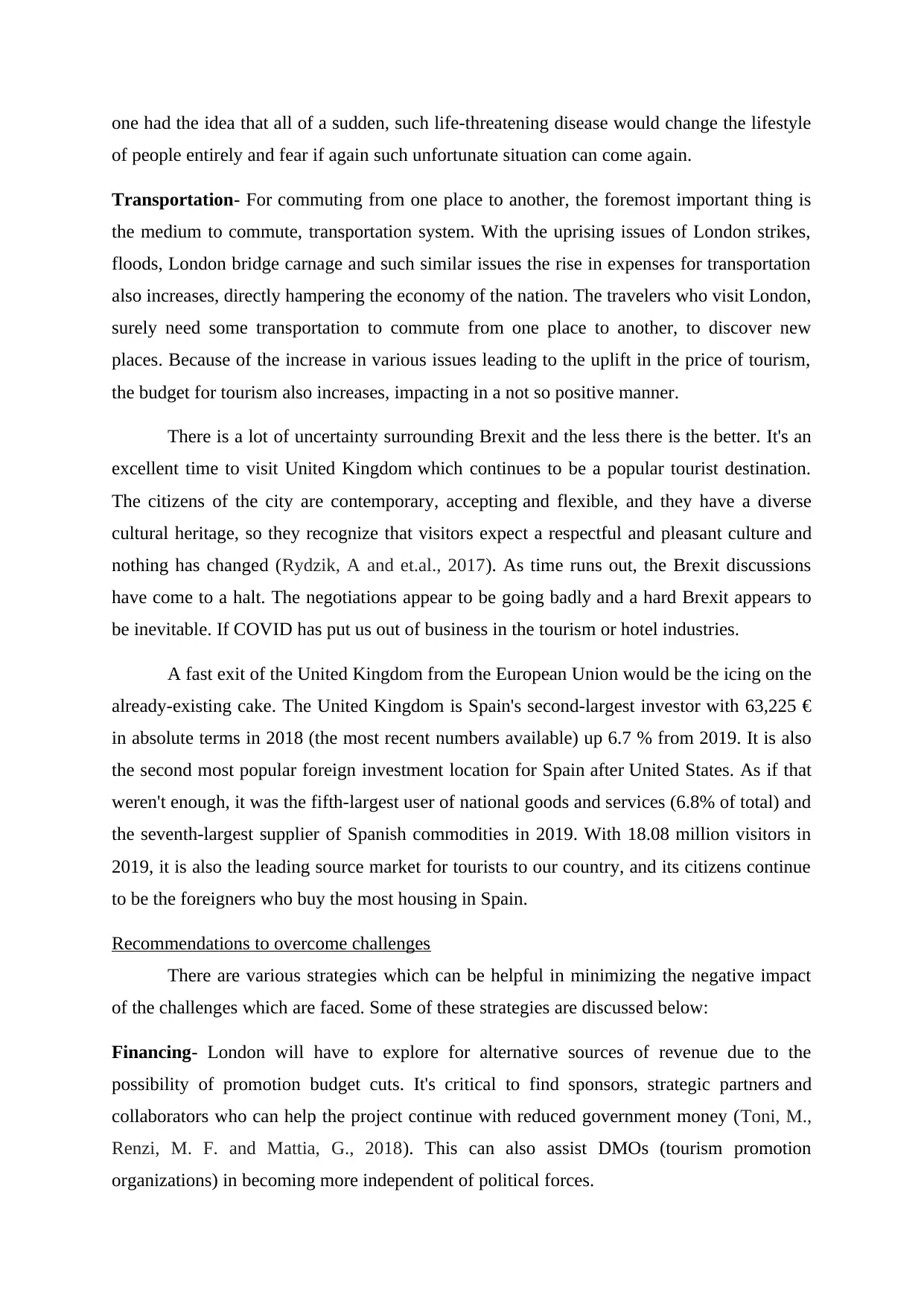
one had the idea that all of a sudden, such life-threatening disease would change the lifestyle
of people entirely and fear if again such unfortunate situation can come again.
Transportation- For commuting from one place to another, the foremost important thing is
the medium to commute, transportation system. With the uprising issues of London strikes,
floods, London bridge carnage and such similar issues the rise in expenses for transportation
also increases, directly hampering the economy of the nation. The travelers who visit London,
surely need some transportation to commute from one place to another, to discover new
places. Because of the increase in various issues leading to the uplift in the price of tourism,
the budget for tourism also increases, impacting in a not so positive manner.
There is a lot of uncertainty surrounding Brexit and the less there is the better. It's an
excellent time to visit United Kingdom which continues to be a popular tourist destination.
The citizens of the city are contemporary, accepting and flexible, and they have a diverse
cultural heritage, so they recognize that visitors expect a respectful and pleasant culture and
nothing has changed (Rydzik, A and et.al., 2017). As time runs out, the Brexit discussions
have come to a halt. The negotiations appear to be going badly and a hard Brexit appears to
be inevitable. If COVID has put us out of business in the tourism or hotel industries.
A fast exit of the United Kingdom from the European Union would be the icing on the
already-existing cake. The United Kingdom is Spain's second-largest investor with 63,225 €
in absolute terms in 2018 (the most recent numbers available) up 6.7 % from 2019. It is also
the second most popular foreign investment location for Spain after United States. As if that
weren't enough, it was the fifth-largest user of national goods and services (6.8% of total) and
the seventh-largest supplier of Spanish commodities in 2019. With 18.08 million visitors in
2019, it is also the leading source market for tourists to our country, and its citizens continue
to be the foreigners who buy the most housing in Spain.
Recommendations to overcome challenges
There are various strategies which can be helpful in minimizing the negative impact
of the challenges which are faced. Some of these strategies are discussed below:
Financing- London will have to explore for alternative sources of revenue due to the
possibility of promotion budget cuts. It's critical to find sponsors, strategic partners and
collaborators who can help the project continue with reduced government money (Toni, M.,
Renzi, M. F. and Mattia, G., 2018). This can also assist DMOs (tourism promotion
organizations) in becoming more independent of political forces.
of people entirely and fear if again such unfortunate situation can come again.
Transportation- For commuting from one place to another, the foremost important thing is
the medium to commute, transportation system. With the uprising issues of London strikes,
floods, London bridge carnage and such similar issues the rise in expenses for transportation
also increases, directly hampering the economy of the nation. The travelers who visit London,
surely need some transportation to commute from one place to another, to discover new
places. Because of the increase in various issues leading to the uplift in the price of tourism,
the budget for tourism also increases, impacting in a not so positive manner.
There is a lot of uncertainty surrounding Brexit and the less there is the better. It's an
excellent time to visit United Kingdom which continues to be a popular tourist destination.
The citizens of the city are contemporary, accepting and flexible, and they have a diverse
cultural heritage, so they recognize that visitors expect a respectful and pleasant culture and
nothing has changed (Rydzik, A and et.al., 2017). As time runs out, the Brexit discussions
have come to a halt. The negotiations appear to be going badly and a hard Brexit appears to
be inevitable. If COVID has put us out of business in the tourism or hotel industries.
A fast exit of the United Kingdom from the European Union would be the icing on the
already-existing cake. The United Kingdom is Spain's second-largest investor with 63,225 €
in absolute terms in 2018 (the most recent numbers available) up 6.7 % from 2019. It is also
the second most popular foreign investment location for Spain after United States. As if that
weren't enough, it was the fifth-largest user of national goods and services (6.8% of total) and
the seventh-largest supplier of Spanish commodities in 2019. With 18.08 million visitors in
2019, it is also the leading source market for tourists to our country, and its citizens continue
to be the foreigners who buy the most housing in Spain.
Recommendations to overcome challenges
There are various strategies which can be helpful in minimizing the negative impact
of the challenges which are faced. Some of these strategies are discussed below:
Financing- London will have to explore for alternative sources of revenue due to the
possibility of promotion budget cuts. It's critical to find sponsors, strategic partners and
collaborators who can help the project continue with reduced government money (Toni, M.,
Renzi, M. F. and Mattia, G., 2018). This can also assist DMOs (tourism promotion
organizations) in becoming more independent of political forces.
Paraphrase This Document
Need a fresh take? Get an instant paraphrase of this document with our AI Paraphraser
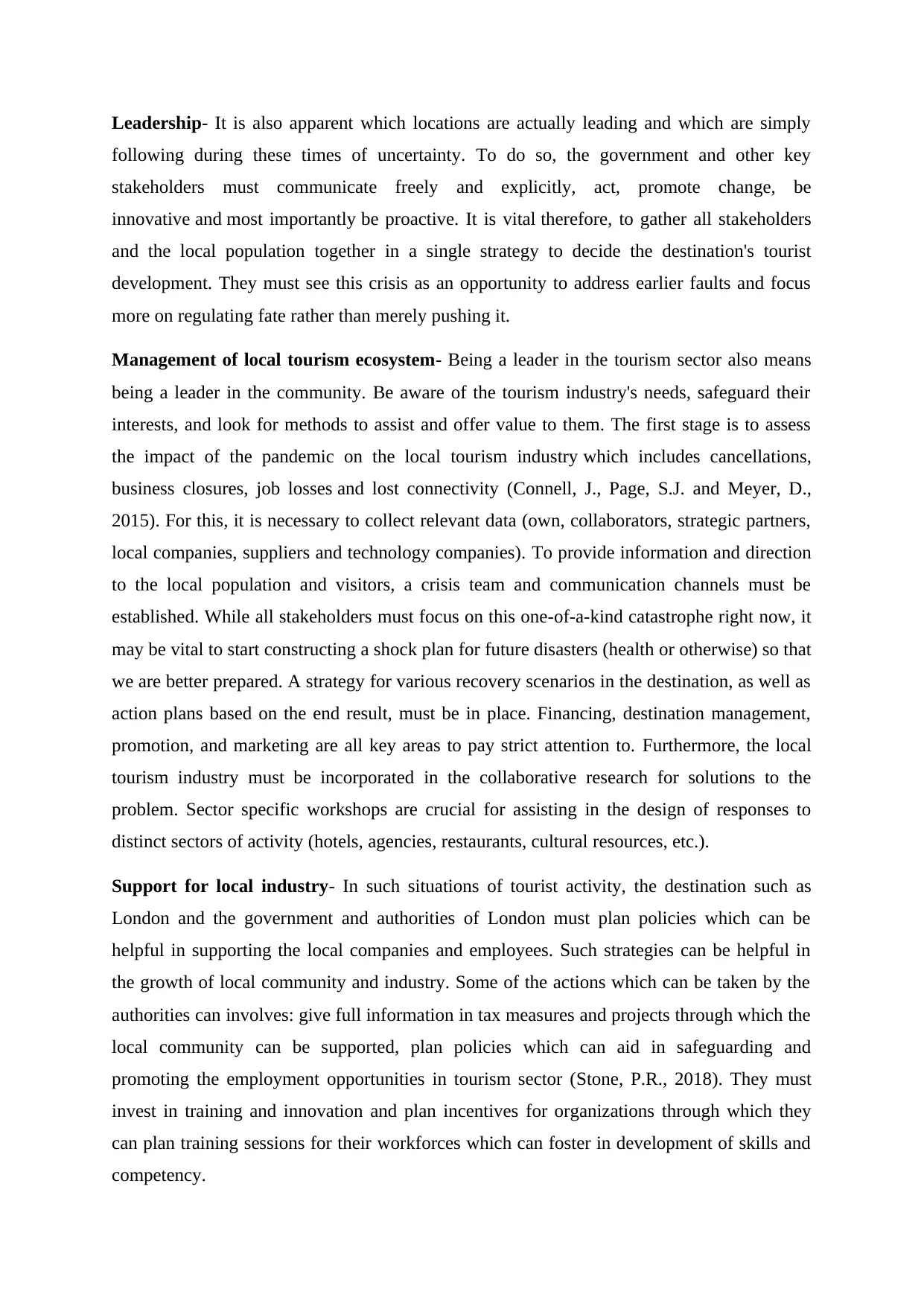
Leadership- It is also apparent which locations are actually leading and which are simply
following during these times of uncertainty. To do so, the government and other key
stakeholders must communicate freely and explicitly, act, promote change, be
innovative and most importantly be proactive. It is vital therefore, to gather all stakeholders
and the local population together in a single strategy to decide the destination's tourist
development. They must see this crisis as an opportunity to address earlier faults and focus
more on regulating fate rather than merely pushing it.
Management of local tourism ecosystem- Being a leader in the tourism sector also means
being a leader in the community. Be aware of the tourism industry's needs, safeguard their
interests, and look for methods to assist and offer value to them. The first stage is to assess
the impact of the pandemic on the local tourism industry which includes cancellations,
business closures, job losses and lost connectivity (Connell, J., Page, S.J. and Meyer, D.,
2015). For this, it is necessary to collect relevant data (own, collaborators, strategic partners,
local companies, suppliers and technology companies). To provide information and direction
to the local population and visitors, a crisis team and communication channels must be
established. While all stakeholders must focus on this one-of-a-kind catastrophe right now, it
may be vital to start constructing a shock plan for future disasters (health or otherwise) so that
we are better prepared. A strategy for various recovery scenarios in the destination, as well as
action plans based on the end result, must be in place. Financing, destination management,
promotion, and marketing are all key areas to pay strict attention to. Furthermore, the local
tourism industry must be incorporated in the collaborative research for solutions to the
problem. Sector specific workshops are crucial for assisting in the design of responses to
distinct sectors of activity (hotels, agencies, restaurants, cultural resources, etc.).
Support for local industry- In such situations of tourist activity, the destination such as
London and the government and authorities of London must plan policies which can be
helpful in supporting the local companies and employees. Such strategies can be helpful in
the growth of local community and industry. Some of the actions which can be taken by the
authorities can involves: give full information in tax measures and projects through which the
local community can be supported, plan policies which can aid in safeguarding and
promoting the employment opportunities in tourism sector (Stone, P.R., 2018). They must
invest in training and innovation and plan incentives for organizations through which they
can plan training sessions for their workforces which can foster in development of skills and
competency.
following during these times of uncertainty. To do so, the government and other key
stakeholders must communicate freely and explicitly, act, promote change, be
innovative and most importantly be proactive. It is vital therefore, to gather all stakeholders
and the local population together in a single strategy to decide the destination's tourist
development. They must see this crisis as an opportunity to address earlier faults and focus
more on regulating fate rather than merely pushing it.
Management of local tourism ecosystem- Being a leader in the tourism sector also means
being a leader in the community. Be aware of the tourism industry's needs, safeguard their
interests, and look for methods to assist and offer value to them. The first stage is to assess
the impact of the pandemic on the local tourism industry which includes cancellations,
business closures, job losses and lost connectivity (Connell, J., Page, S.J. and Meyer, D.,
2015). For this, it is necessary to collect relevant data (own, collaborators, strategic partners,
local companies, suppliers and technology companies). To provide information and direction
to the local population and visitors, a crisis team and communication channels must be
established. While all stakeholders must focus on this one-of-a-kind catastrophe right now, it
may be vital to start constructing a shock plan for future disasters (health or otherwise) so that
we are better prepared. A strategy for various recovery scenarios in the destination, as well as
action plans based on the end result, must be in place. Financing, destination management,
promotion, and marketing are all key areas to pay strict attention to. Furthermore, the local
tourism industry must be incorporated in the collaborative research for solutions to the
problem. Sector specific workshops are crucial for assisting in the design of responses to
distinct sectors of activity (hotels, agencies, restaurants, cultural resources, etc.).
Support for local industry- In such situations of tourist activity, the destination such as
London and the government and authorities of London must plan policies which can be
helpful in supporting the local companies and employees. Such strategies can be helpful in
the growth of local community and industry. Some of the actions which can be taken by the
authorities can involves: give full information in tax measures and projects through which the
local community can be supported, plan policies which can aid in safeguarding and
promoting the employment opportunities in tourism sector (Stone, P.R., 2018). They must
invest in training and innovation and plan incentives for organizations through which they
can plan training sessions for their workforces which can foster in development of skills and
competency.
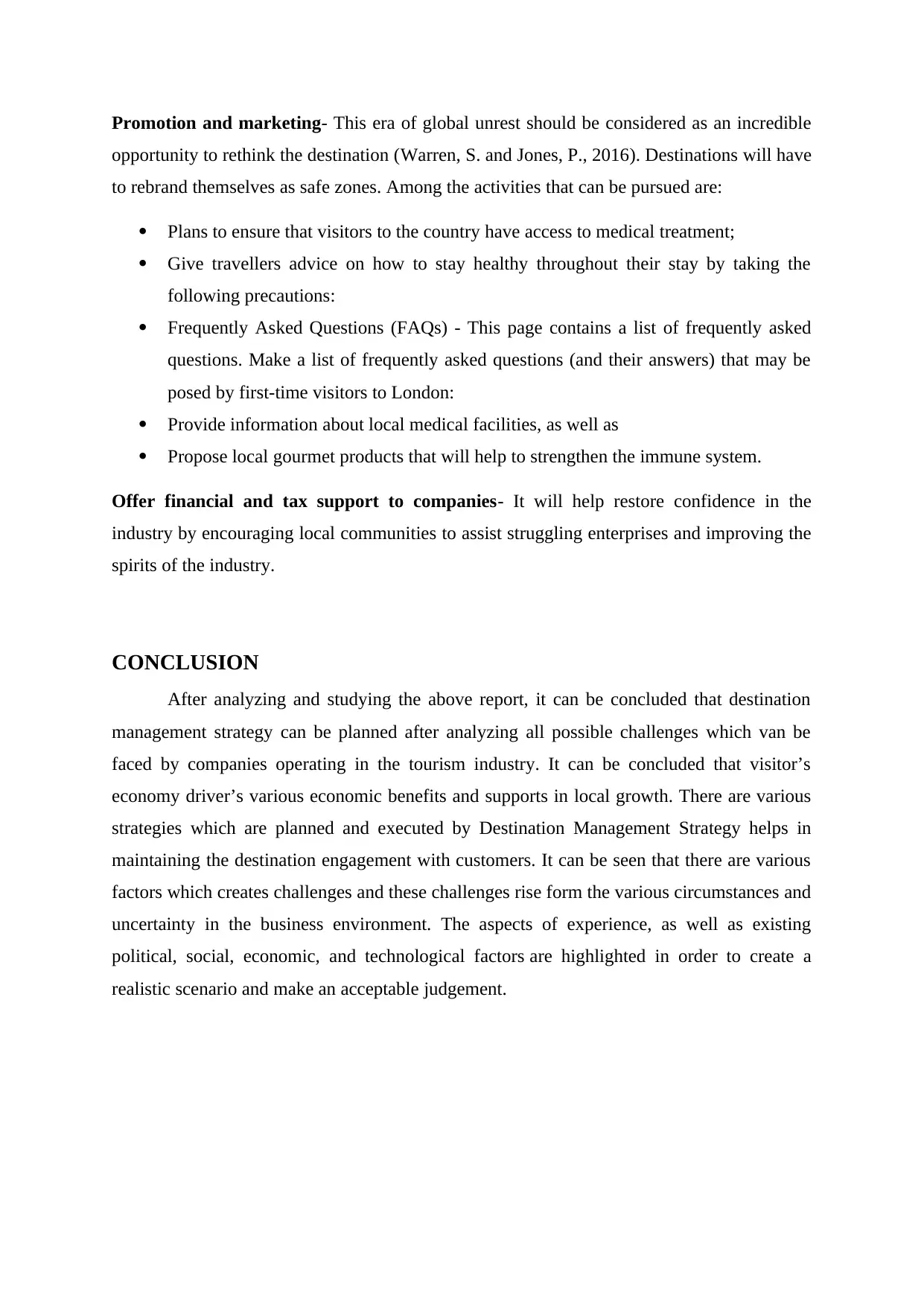
Promotion and marketing- This era of global unrest should be considered as an incredible
opportunity to rethink the destination (Warren, S. and Jones, P., 2016). Destinations will have
to rebrand themselves as safe zones. Among the activities that can be pursued are:
Plans to ensure that visitors to the country have access to medical treatment;
Give travellers advice on how to stay healthy throughout their stay by taking the
following precautions:
Frequently Asked Questions (FAQs) - This page contains a list of frequently asked
questions. Make a list of frequently asked questions (and their answers) that may be
posed by first-time visitors to London:
Provide information about local medical facilities, as well as
Propose local gourmet products that will help to strengthen the immune system.
Offer financial and tax support to companies- It will help restore confidence in the
industry by encouraging local communities to assist struggling enterprises and improving the
spirits of the industry.
CONCLUSION
After analyzing and studying the above report, it can be concluded that destination
management strategy can be planned after analyzing all possible challenges which van be
faced by companies operating in the tourism industry. It can be concluded that visitor’s
economy driver’s various economic benefits and supports in local growth. There are various
strategies which are planned and executed by Destination Management Strategy helps in
maintaining the destination engagement with customers. It can be seen that there are various
factors which creates challenges and these challenges rise form the various circumstances and
uncertainty in the business environment. The aspects of experience, as well as existing
political, social, economic, and technological factors are highlighted in order to create a
realistic scenario and make an acceptable judgement.
opportunity to rethink the destination (Warren, S. and Jones, P., 2016). Destinations will have
to rebrand themselves as safe zones. Among the activities that can be pursued are:
Plans to ensure that visitors to the country have access to medical treatment;
Give travellers advice on how to stay healthy throughout their stay by taking the
following precautions:
Frequently Asked Questions (FAQs) - This page contains a list of frequently asked
questions. Make a list of frequently asked questions (and their answers) that may be
posed by first-time visitors to London:
Provide information about local medical facilities, as well as
Propose local gourmet products that will help to strengthen the immune system.
Offer financial and tax support to companies- It will help restore confidence in the
industry by encouraging local communities to assist struggling enterprises and improving the
spirits of the industry.
CONCLUSION
After analyzing and studying the above report, it can be concluded that destination
management strategy can be planned after analyzing all possible challenges which van be
faced by companies operating in the tourism industry. It can be concluded that visitor’s
economy driver’s various economic benefits and supports in local growth. There are various
strategies which are planned and executed by Destination Management Strategy helps in
maintaining the destination engagement with customers. It can be seen that there are various
factors which creates challenges and these challenges rise form the various circumstances and
uncertainty in the business environment. The aspects of experience, as well as existing
political, social, economic, and technological factors are highlighted in order to create a
realistic scenario and make an acceptable judgement.
⊘ This is a preview!⊘
Do you want full access?
Subscribe today to unlock all pages.

Trusted by 1+ million students worldwide
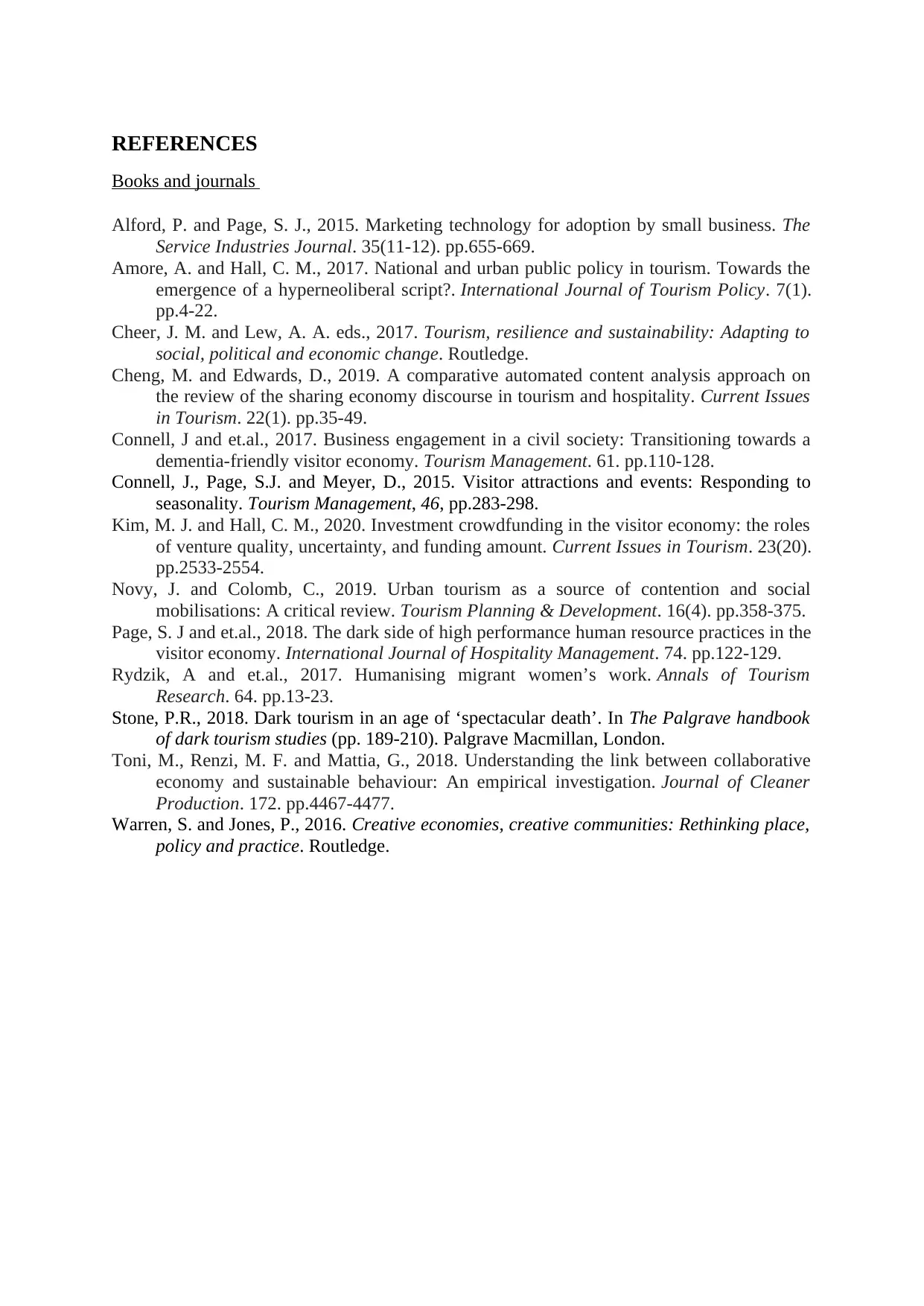
REFERENCES
Books and journals
Alford, P. and Page, S. J., 2015. Marketing technology for adoption by small business. The
Service Industries Journal. 35(11-12). pp.655-669.
Amore, A. and Hall, C. M., 2017. National and urban public policy in tourism. Towards the
emergence of a hyperneoliberal script?. International Journal of Tourism Policy. 7(1).
pp.4-22.
Cheer, J. M. and Lew, A. A. eds., 2017. Tourism, resilience and sustainability: Adapting to
social, political and economic change. Routledge.
Cheng, M. and Edwards, D., 2019. A comparative automated content analysis approach on
the review of the sharing economy discourse in tourism and hospitality. Current Issues
in Tourism. 22(1). pp.35-49.
Connell, J and et.al., 2017. Business engagement in a civil society: Transitioning towards a
dementia-friendly visitor economy. Tourism Management. 61. pp.110-128.
Connell, J., Page, S.J. and Meyer, D., 2015. Visitor attractions and events: Responding to
seasonality. Tourism Management, 46, pp.283-298.
Kim, M. J. and Hall, C. M., 2020. Investment crowdfunding in the visitor economy: the roles
of venture quality, uncertainty, and funding amount. Current Issues in Tourism. 23(20).
pp.2533-2554.
Novy, J. and Colomb, C., 2019. Urban tourism as a source of contention and social
mobilisations: A critical review. Tourism Planning & Development. 16(4). pp.358-375.
Page, S. J and et.al., 2018. The dark side of high performance human resource practices in the
visitor economy. International Journal of Hospitality Management. 74. pp.122-129.
Rydzik, A and et.al., 2017. Humanising migrant women’s work. Annals of Tourism
Research. 64. pp.13-23.
Stone, P.R., 2018. Dark tourism in an age of ‘spectacular death’. In The Palgrave handbook
of dark tourism studies (pp. 189-210). Palgrave Macmillan, London.
Toni, M., Renzi, M. F. and Mattia, G., 2018. Understanding the link between collaborative
economy and sustainable behaviour: An empirical investigation. Journal of Cleaner
Production. 172. pp.4467-4477.
Warren, S. and Jones, P., 2016. Creative economies, creative communities: Rethinking place,
policy and practice. Routledge.
Books and journals
Alford, P. and Page, S. J., 2015. Marketing technology for adoption by small business. The
Service Industries Journal. 35(11-12). pp.655-669.
Amore, A. and Hall, C. M., 2017. National and urban public policy in tourism. Towards the
emergence of a hyperneoliberal script?. International Journal of Tourism Policy. 7(1).
pp.4-22.
Cheer, J. M. and Lew, A. A. eds., 2017. Tourism, resilience and sustainability: Adapting to
social, political and economic change. Routledge.
Cheng, M. and Edwards, D., 2019. A comparative automated content analysis approach on
the review of the sharing economy discourse in tourism and hospitality. Current Issues
in Tourism. 22(1). pp.35-49.
Connell, J and et.al., 2017. Business engagement in a civil society: Transitioning towards a
dementia-friendly visitor economy. Tourism Management. 61. pp.110-128.
Connell, J., Page, S.J. and Meyer, D., 2015. Visitor attractions and events: Responding to
seasonality. Tourism Management, 46, pp.283-298.
Kim, M. J. and Hall, C. M., 2020. Investment crowdfunding in the visitor economy: the roles
of venture quality, uncertainty, and funding amount. Current Issues in Tourism. 23(20).
pp.2533-2554.
Novy, J. and Colomb, C., 2019. Urban tourism as a source of contention and social
mobilisations: A critical review. Tourism Planning & Development. 16(4). pp.358-375.
Page, S. J and et.al., 2018. The dark side of high performance human resource practices in the
visitor economy. International Journal of Hospitality Management. 74. pp.122-129.
Rydzik, A and et.al., 2017. Humanising migrant women’s work. Annals of Tourism
Research. 64. pp.13-23.
Stone, P.R., 2018. Dark tourism in an age of ‘spectacular death’. In The Palgrave handbook
of dark tourism studies (pp. 189-210). Palgrave Macmillan, London.
Toni, M., Renzi, M. F. and Mattia, G., 2018. Understanding the link between collaborative
economy and sustainable behaviour: An empirical investigation. Journal of Cleaner
Production. 172. pp.4467-4477.
Warren, S. and Jones, P., 2016. Creative economies, creative communities: Rethinking place,
policy and practice. Routledge.
1 out of 10
Related Documents
Your All-in-One AI-Powered Toolkit for Academic Success.
+13062052269
info@desklib.com
Available 24*7 on WhatsApp / Email
![[object Object]](/_next/static/media/star-bottom.7253800d.svg)
Unlock your academic potential
Copyright © 2020–2026 A2Z Services. All Rights Reserved. Developed and managed by ZUCOL.




